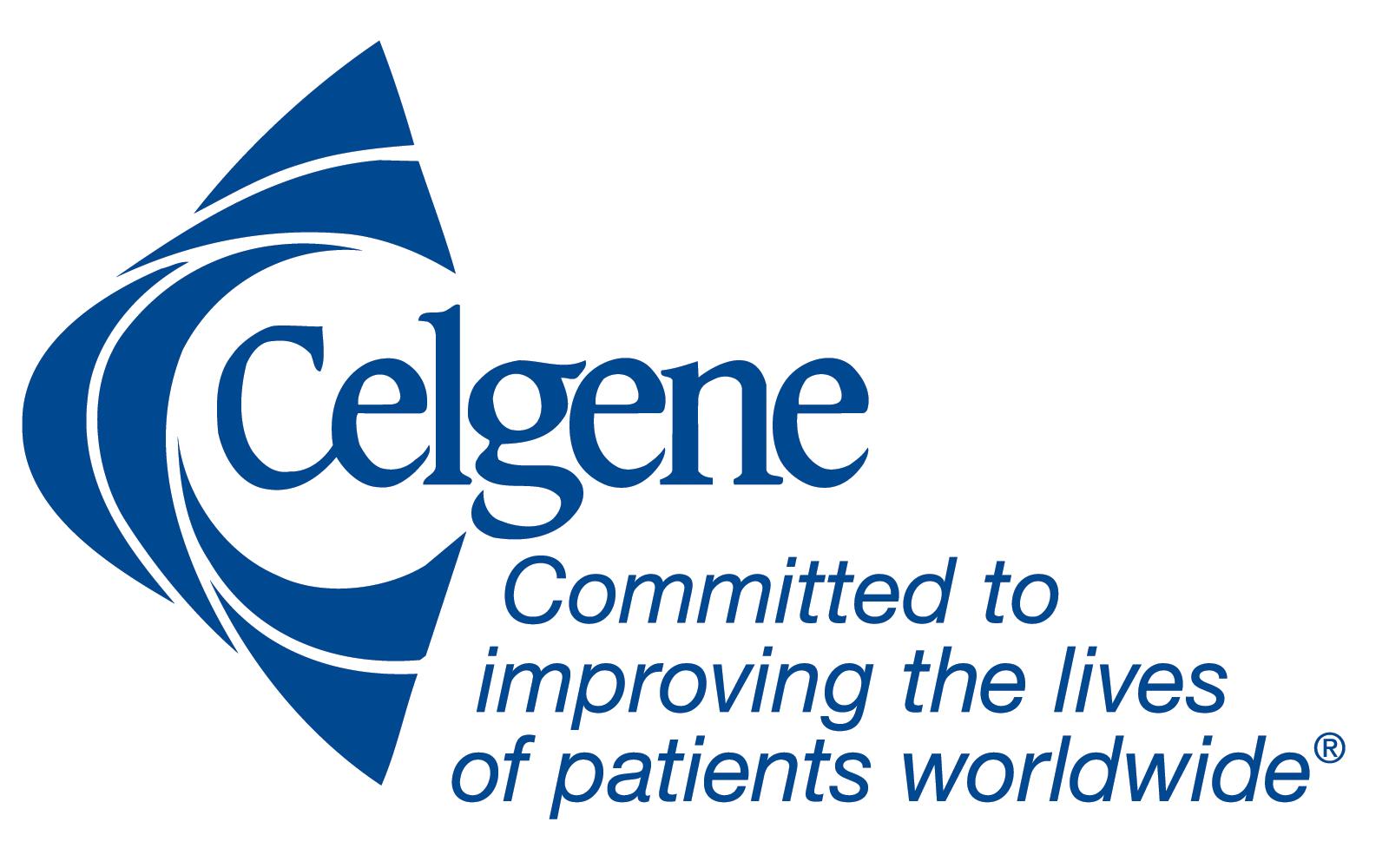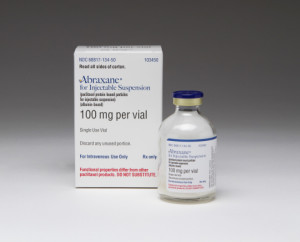-Approval Based on MPACT Study of ABRAXANE in Combination with Gemcitabine Demonstrating a Clinically Meaningful Increase in Overall Survival-
-First New Treatment Approved for Metastatic Adenocarcinoma of the Pancreas in Nearly 8 Years-
Friday, September 6, 2013 1:05 pm EDT
SUMMIT, N.J. (NASDAQ:CELG)
“Historically, patients with pancreatic cancer have not experienced benefit with many of the drugs so useful in other malignancies. This is beginning to change”
 Celgene Corporation (NASDAQ: CELG) today announced that the U.S. Food and Drug Administration (FDA) has approved the Company’s supplemental New Drug Application (sNDA) of ABRAXANE® (paclitaxel protein-bound particles for injectable suspension) (albumin-bound) as first–line treatment for patients with metastatic adenocarcinoma of the pancreas, in combination with gemcitabine. Adenocarcinoma, a sub-type of exocrine tumors, accounts for about 95% of cancers of the pancreas.
Celgene Corporation (NASDAQ: CELG) today announced that the U.S. Food and Drug Administration (FDA) has approved the Company’s supplemental New Drug Application (sNDA) of ABRAXANE® (paclitaxel protein-bound particles for injectable suspension) (albumin-bound) as first–line treatment for patients with metastatic adenocarcinoma of the pancreas, in combination with gemcitabine. Adenocarcinoma, a sub-type of exocrine tumors, accounts for about 95% of cancers of the pancreas.
“For more than 15 years, treatment with gemcitabine has been the standard of care in this disease. The addition of ABRAXANE to gemcitabine demonstrated meaningful improvements across key efficacy outcomes, including overall survival, with a well-characterized safety profile,” said Jean-Pierre Bizzari, M.D., Executive Vice President of Hematology and Oncology for Celgene Corporation.
“We are pleased that patients with advanced pancreatic cancer now have a new treatment option helping to expand the treatment landscape for the fourth leading cause of cancer death in the United States,” said Julie Fleshman, president and CEO of the Pancreatic Cancer Action Network. “The FDA approval of ABRAXANE is an important step for a disease that desperately needs treatment advances to improve patient outcomes. The Pancreatic Cancer Action Network will continue to work with the medical community to build upon this success and advance our goals in the fight against pancreatic cancer.”
 ABRAXANE in combination with gemcitabine is the first new treatment approved for metastatic adenocarcinoma of the pancreas in nearly eight years. The approval was based on results from MPACT (Metastatic Pancreatic Adenocarcinoma Clinical Trial), an open-label, phase III, randomized, international study, that were featured at this year’s ASCO annual meeting and have been submitted for publication in a peer-reviewed journal. Over the past two decades, more than 30 randomized, phase III studies have been conducted in patients with advanced pancreatic cancer and the MPACT study was one of four studies to show an overall survival benefit. In the MPACT study, which involved 861 chemotherapy-naïve patients with metastatic pancreatic cancer, ABRAXANE plus gemcitabine demonstrated a statistically significant improvement in median overall survival compared to gemcitabine alone (8.5 vs. 6.7 months) (HR 0.72, P<0.0001); a 28% overall reduction in risk of death. ABRAXANE plus gemcitabine demonstrated a median progression-free survival (PFS) of 5.5 vs. 3.7 months for gemcitabine alone (HR 0.69, P<0.0001); a 31% reduction in the risk of progression or death. The Overall Response Rate (ORR) was 23% for the ABRAXANE plus gemcitabine arm versus 7% in the gemcitabine alone arm (p<0.0001).
ABRAXANE in combination with gemcitabine is the first new treatment approved for metastatic adenocarcinoma of the pancreas in nearly eight years. The approval was based on results from MPACT (Metastatic Pancreatic Adenocarcinoma Clinical Trial), an open-label, phase III, randomized, international study, that were featured at this year’s ASCO annual meeting and have been submitted for publication in a peer-reviewed journal. Over the past two decades, more than 30 randomized, phase III studies have been conducted in patients with advanced pancreatic cancer and the MPACT study was one of four studies to show an overall survival benefit. In the MPACT study, which involved 861 chemotherapy-naïve patients with metastatic pancreatic cancer, ABRAXANE plus gemcitabine demonstrated a statistically significant improvement in median overall survival compared to gemcitabine alone (8.5 vs. 6.7 months) (HR 0.72, P<0.0001); a 28% overall reduction in risk of death. ABRAXANE plus gemcitabine demonstrated a median progression-free survival (PFS) of 5.5 vs. 3.7 months for gemcitabine alone (HR 0.69, P<0.0001); a 31% reduction in the risk of progression or death. The Overall Response Rate (ORR) was 23% for the ABRAXANE plus gemcitabine arm versus 7% in the gemcitabine alone arm (p<0.0001).
“Historically, patients with pancreatic cancer have not experienced benefit with many of the drugs so useful in other malignancies. This is beginning to change,” said Margaret A. Tempero, M.D., Director and Professor of Medicine, UCSF Pancreas Center. “The combination of ABRAXANE and gemcitabine represents an important new therapeutic option for patients with pancreatic cancer. It also provides a foundation for future clinical research.”
The most common adverse reactions (≥ 20%) with a ≥ 5% higher incidence in the ABRAXANE/gemcitabine treatment group are neutropenia, fatigue, peripheral neuropathy, nausea, alopecia, peripheral edema, diarrhea, pyrexia, vomiting, decreased appetite, rash, and dehydration. For additional safety information, please see Boxed Warning and Contraindications in the Important Safety Information.
The FDA had granted ABRAXANE a Priority Review designation in May 2013 with a PDUFA date of September 21, 2013. In April 2013, the European Medicines Agency (EMA) also accepted for review a Type II Variation to the current Marketing Authorization Application (MAA) for ABRAXANE, in combination with gemcitabine, for the first–line treatment of patients with metastatic adenocarcinoma of the pancreas. Celgene has submitted dossiers for registration in other countries/regions.
About the MPACT Study
In the MPACT (Metastatic Pancreatic Adenocarcinoma Clinical Trial) study, a Celgene-sponsored, open-label, randomized, international study, a total of 861 patients were randomized 1:1 (431 patients to the ABRAXANE/gemcitabine group and 430 patients to the gemcitabine group). Patients randomized to ABRAXANE/gemcitabine received ABRAXANE as an intravenous infusion over 30-40 minutes at a dose of 125 mg/m2 followed by gemcitabine as an intravenous infusion over 30-40 minutes at a dose of 1000 mg/m2 given on Days 1, 8 and 15 of each 28-day cycle. In the comparator treatment group, gemcitabine monotherapy was administered at a dose of 1000 mg/m2 given weekly for 7 weeks followed by a 1-week rest period in Cycle 1 and in Cycle 2 and onwards was administered on Days 1, 8 and 15 of a 28 day cycle. The primary endpoint for the study was overall survival. Secondary endpoints were progression-free survival and overall response rate determined by independent radiological review. Other endpoints included progression-free survival and overall response rate as determined by the investigator, and the safety and tolerability of the combination in this patient population.
About Pancreatic Cancer
Pancreatic cancer is the fourth-leading cause of cancer-related death in the U.S. The pancreas is composed of two main cell types: exocrine and endocrine. Exocrine tumors are by far the most common type of pancreatic cancer. Adenocarcinoma is a sub-type of exocrine tumors and accounts for about 95% of cancers of the pancreas. For all stages of pancreatic cancer combined, the five-year survival rate is about 6%, which is the lowest of any cancer in the U.S. For metastatic pancreatic cancer, the five-year survival is approximately 2%.
About ABRAXANE®
ABRAXANE is an albumin-bound form of paclitaxel that is manufactured using patented nab® technology. ABRAXANE is formulated with albumin, a human protein, and is free of solvents.
In the United States, ABRAXANE was first approved in January 2005 for the treatment of breast cancer after failure of combination chemotherapy for metastatic disease or relapse within 6 months of adjuvant chemotherapy. Prior therapy should have included an anthracycline unless clinically contraindicated. ABRAXANE has been globally approved in more than forty countries for the treatment of metastatic breast cancer (MBC).
In October 2012, ABRAXANE was approved by the FDA for the first-line treatment of locally advanced or metastatic non-small cell lung cancer (NSCLC), in combination with carboplatin, in patients who are not candidates for curative surgery or radiation therapy. ABRAXANE is also approved for the treatment of NSCLC in Argentina, Australia, Japan, and New Zealand. In addition, ABRAXANE is approved for gastric cancer in Japan.
In September 2013, the FDA approved ABRAXANE as first–line treatment of patients with metastatic adenocarcinoma of the pancreas, in combination with gemcitabine.
U.S. Regulatory Information for ABRAXANE
ABRAXANE is indicated for the treatment of breast cancer after failure of combination chemotherapy for metastatic disease or relapse within 6 months of adjuvant chemotherapy. Prior therapy should have included an anthracycline unless clinically contraindicated
ABRAXANE is indicated for the first-line treatment of locally advanced or metastatic non-small cell lung cancer, in combination with carboplatin, in patients who are not candidates for curative surgery or radiation therapy
ABRAXANE is indicated for the first-line treatment of patients with metastatic adenocarcinoma of the pancreas, in combination with gemcitabine.
Please visit the Celgene News Room for important Safety information.
